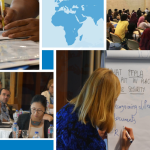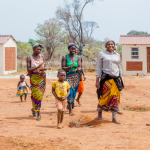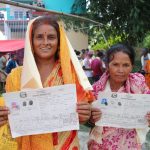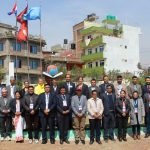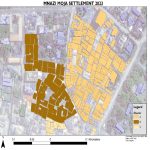Lima, Peru: How Peruvian women get empowered to obtain housing and land access rights
“We want the formation of a National Federation of Grassroots Women, to advocate for our rights to access to land, property and housing”. Meet Luz Maria Sanchez Hurtado, Executive Director of the Peruvian NGO Estrategia and flag bearer of the community-based organisation Women United for a Better Community.
To date there are no laws in place in Peru, to protect communities, living on the hills in and around Lima, from being evicted. The decision-making process in regard to access to housing and land is male dominated, and local and national authorities used to turn a blind eye to the women’s argument that also they have a stake in housing and land issues. That is, until recently…
Some 360,000 families occupy the hills in the vulnerable area of the San Juan de Lurigancho District, the largest in Peru. In Lima alone there are no less than 600 human settlements without land titles. The plots of land where the communities settled down some thirty years ago, are located in the rustic areas out of the city of Lima. Over the years, the communities have improved the area through various internationally funded support programs and community initiatives: water supply and sewage systems were established, retaining walls constructed and stairs built for easier access to the residential areas. Although plots of land in the rustic areas are affordable to the population, the private sector has determined that much of the land on which the communities live are urban land, and hence started requesting high prices for this land, unaffordable to the poor communities. The result of this was constant evictions and the subsequent people’s suffering.

Luz Maria (standing right) during one of the workshops
Luz Maria: “Because of the migration of the people from the rural areas to the city, state land was occupied and the population had to negotiate with the government to take possession of the land and then pay the so-called “justiprecio” or “just price” to get land titles. However, this does not happen with the people who occupy private land. The problems start when the private sector demands high payments for land occupation from the occupants. So the communities decided to take initiative and demand for a solution.”
Women United for a Better Community (Women United in short) was established in 2003 to address women’s participation in the process of obtaining housing and land rights, the latter specifically aimed at land titling. Whereas men dominate the decision-making processes in regard to land, women are principal contributors to activities that benefit the communities, hence their demand for a greater say in issues dealing with land. The first step in this process was identifying the leaders from each community and inform them about the benefits of improving the living conditions of the communities and the importance of having women leaders as principal actors in the process of obtaining land titles. Twenty five women leaders would then be selected for participation in training and sensitisation on housing and land rights issues, and to ensure that these women would diffuse their newly acquired knowledge to other women groups. Also part of the training was the so-called community risk-mapping, to identify threats and obstacles facing the communities. “A key part of the training process is sensitisation”, says Luz Maria, “as there, in a participatory fashion, we manage to assist the grassroots women in identifying the risks to which the communities are exposed. When we train the grassroots women in urban legislation for example, they manage to see the challenges they face in that area.”
But before issues in regard to urban legislation are brought up, the grassroots women attend workshops where they learn about leadership, democracy, citizenship, self-esteem, human rights, housing as a basic human right, advocacy, among others. During the workshop the women work in groups and present their findings to the other groups. During the training, the women elect a Management Committee, consisting of five members, which becomes responsible for advocacy efforts towards the local and state authorities on housing and land rights issues.
Once the training has been completed, the women leaders organise a public event, in which local and state authorities, such as the community Mayor, the Ministries of Housing and Environment, as well as civil society organisations are invited to participate. Also invited are state agencies such INDECI (National Institute for Civil Defense) and COFOPRI (the Informal Property Formalization Committee), who are involved in the land titling process in Peru.

Community members form a working group to begin the mapping process
Luz Maria: “The training is technical in kind and is meant to teach the grassroots women about the vulnerabilities of the community and how challenges can be solved. We also provide support in the design of retaining walls and stairs up in the hills, which the Management Committee takes to the local authorities. Technicians from the local government use this information to develop maps and determine a budget, after which the local government, together with the beneficiary community, present the plans and budget to INDECI and COFOPRI for approval. Once approved, the occupants are likely to obtain land titles.”
Collaboration with GLTN and results to date
In 2008, Women United were invited to Nairobi, Kenya, by GLTN/UN-Habitat, after the latter received a concept paper with the proposal to train grassroots women in 11 districts in Lima in issues pertaining housing and land access rights in Peru. In 2009 the proposal was approved by the GLTN Steering Committee and financial support was provided for the commencement of a pilot programme in the city of Lima. The proposal also contained a section on following up this initiative at the national level, and train as many grassroots women as possible in housing and land access rights.
The results to date have been quite remarkable:
- Communities from Las Brisas, Santa Rosa, Horacio Zevallos from the RIMAC District got land titles after they accomplished the constructions of retaining walls and stairs according to INDECI and COFOPRI requirements;
- Communities of Virgen del Carmen and Los Incas from the old areas of Lima city, who suffered for years from evictions, were finally relocated by the Municipality of Lima to an area built by the local government, and now have titles
- After communities in the district of Chocos at the High Andean of Peru received training in land and housing, the got the support of the Mayor to engage in a land sanitation process under the programme called Participatory Budget. After the land sanitaton was finished under the supervision of INDECI, the population got their land titles. The Chocos programme was taken as an example and further spread to other districts in the Province of Yauyos. Out of the 16 districts of the Yauyos Province, 12 now have land titles;
- In the District of Los Olivos, the community called Las Vegas were also issued land titles by COFOPRI, after it completed the construction of retaining walls and stairs leading up to the hills.
- With the support of GLTN grassroots women were trained in disaster prevention. Estrategia provided technical support to the community in designing maps for retaining walls. These were presented to the local government and the community received support for their construction. In the same vein, the Emape Municipality in the Rimac district, received support for the construction of some 40 retaining walls and 60 stairs.
Luz Maria: “These are very encouraging developments and provide us, Women United for a Better Community, an important incentive to continue our work, form a National Federation and see to it that we can take our initiatives to the national level.”


